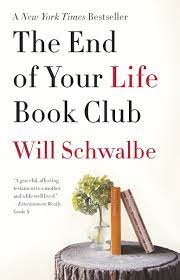The End of Your Life Book Club

How I came across it
I’ve noticed that I’m often a little more open to sitting with themes surrounding death and loss than some of my friends. I willingly immerse myself in books that take their sweet time in unpacking feelings of deep grief over the loss of loved ones. It’s not that I’m immune to it - I feel all of it very intensely and cry a lot while reading lol. Yet I continue reading because I find that these books, sometimes labeled as “too sad and depressing”, give me a deeper perspective on life. The End of Your Life Book Club by Will Schwalbe is one of those books. I don’t exactly remember how I came across it, but I remember I was immediately drawn to the theme of a meditation on life and death - how one decides to spend their time as they near the end of their life, and how the people that love them grapple with this situation.
Setup and significance
Will Shwalbe’s mother, Mary Anne, is diagnosed with stage IV pancreatic cancer in her early 70s. The family is heartbroken and in shock to learn that patients with this diagnosis typically have anywhere from 2 to 6 months left to live. As she begins palliative chemotherapy, Will finds himself spending a lot of time in the hospital with her. Both being huge book worms, they naturally start talking about and sharing with each other the books they are reading at these frequent hospital visits. Through dozens of books, both fictional and non-fictional, Will and Mary Anne discuss themes that we all grapple with: courage, fear, hope, despair, fate, perseverance, faith, kindness, generosity, love, life, and death.
Parts that I enjoyed
Over the chapters, Will describes his mother’s difficult battle with cancer alongside the discussions that they had about dozens of books that they read together. What was really brought to light as I read along was how much of an opportunity the books gave them to discuss topics that would have been otherwise difficult to talk about.
Sometimes, a character in a book would trigger old memories. Will would bring up a sad or awkward childhood memory and ask about what his mom was thinking back then. Mary Anne would bring up stories from before Will’s time - her college memories, previous jobs, and so on.
Other times, the books would bring them to a more touchy topic: faith. Mary Anne was a woman devoted to faith, while Will could not resonate with that and had given up going to church a long time ago. Even though they would never be on the same page about faith, they would still discuss thoughts over the books that they read together.
There are even times when the books lead them to discuss death. The difficulty of talking about death with your parent who is dying of a terminal disease goes without saying. Nonetheless, Will and Mary Anne discuss several themes surrounding life and death over many books. Themes such as: what is a life well lived? How are we to spend our times when we know the end is near? When someone dies, what happens to those who are left?
Talking about deep themes in the context of the fictional characters, rather than in the context of their own lives, gave them the safe space to discuss themes that are deeply rooted in their lives –or in anyone’s life for that matter.
Lastly, there was one passage that really spoke to me. It’s a passage about a moment when Will and Mary Anne are discussing their most recent read, and Will realizes that, even though they had adopted a more formal “book club” style after Mary Anne was diagnosed with cancer, they actually had been talking about what they were reading all their lives:
And then something occurred to me. "You know: the thing about our book club is that we've really been in it all our lives." Mom agreed but pointed out that she'd been doing the same with others too––talking about books with my sister and brother and some of her friends. "I guess we're all in it together," she said. And I couldn't help but smile at the other meaning of the phrase. We're all in the end-of-our-life book club, wheter we acknowledge it or not; each book we read may well be the last, each covnversation the final one.
The end of this passage brings to light that, we’re actually all moving towards death at the same speed as anyone else: one day at a time. And I don’t mean this in a negative way. It’s a simple but profound reminder to recognize the preciousness of this time on earth that we’re gifted with.
Conclusion
As basic as this sounds, the stories really drove home why books have held such a significant role for hundreds of years around the world. Ultimately, it tells us that we are not alone. That other people experience the same humanly struggles as we do, and ponder over the same questions. And that there are always new things out there that we are yet to learn. In a much smaller (but personal) scale, I always find that books are there to help me step back and see the bigger picture when “life” (or “work” lol) gets too stressful.